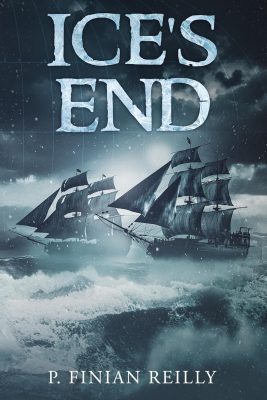Click here to return to the world eco-fiction series
I’m thrilled to talk with P. Finian Reilly about his new novel Ice’s End. It’s only the second time the world eco-fiction series has traveled to Antarctica—the first being a conversation with Ilija Trojanow about his novel Lamentations of Zeno.
About the Book
Ice’s End (12 Willows Press, 2025): A deadly place. A dying planet. A secret frozen in time. In 2123, the world is dying, and Antarctica’s last remaining glaciers are the final source of fresh water. Controlled by the all-powerful StarCross Corporation, Spigot—the continent’s largest water extraction facility—feeds a desperate planet. But off this continent’s frigid shore lies a secret that could change everything.
Chat with the Author
Mary: Hi, and welcome to Dragonfly! I’m excited to talk about your new novel, Ice’s End. First off, what led you to writing this book?
P. Finian: From 2017 to 2020, I worked as a local newspaper reporter in northwest Montana and covered a lot of environmental problems involving water access and water quality. I saw how these basic human needs were affected by 19th Century territorial claims and legal doctrines, and modern trends like climate change, oil production, and reactionary right-wing politics. Towards the end of my time there, I had begun to think that taking this situation to the extreme could make for a good story. After two years of law school, the idea had percolated enough for me to start writing.
Mary: What authors and novels did you enjoy while growing up, and did any inspire you to become a writer?
P. Finian: Two of my favorite novels when I was a kid were Holes by Louis Sachar and the Pendragon series by D.J. MacHale. Both of those focus on young people sent to forbidding, dangerous places, and both have multiple storylines, with events in the past shaping those in the present (and, in Pendragon’s case, the future as well). I wouldn’t say they directly inspired me to become a writer, but they definitely shaped what I value in a story.
Mary: Ice’s End begins in 2123. I’m always curious about how people choose future dates, and what you read to imagine the state of the world at that time (remembering that fiction is still fiction and speculation is natural in fiction).
P. Finian: Projections from the IPCC and other scientific bodies tell us that by the 2120s, we’re likely to have experienced several decades’ worth of warming climate and frequent extreme weather events.
Gabrielle Walker’s book Antarctica: An Intimate Portrait of the World’s Most Mysterious Continent has good information about how Antarctica is likely to respond to the temperature changes, and I also sought input from people who have researched and spent time near Antarctica’s glaciers to be as accurate as possible about likely conditions. I got more creative when it came to describing how climate change will re-shape politics and society by the 2120s. With corporations so powerful in today’s world, it was easy to envision a future where power gets handed to a corporation that can reliably provide fresh water, energy, and security to a decent share of citizens in relatively well-off countries. It was harder—but, I thought, more important—to also include people who resist that status quo and try to build something more equitable.
I specifically picked the year 2123 because it was 100 years after what I thought, very naively, would be the book’s launch year of 2023. I pegged all of the dates and days of the week to the 2123 calendar. By the time we had set a 2025 launch date, I didn’t think a two-year difference was worth going through and updating everything.
Mary: The book has an interesting tie to the Ross Antarctic Expedition. How much historical research did you do for this novel, and did you learn anything new?
P. Finian: I learned lots! The water-production operation in Ice’s End is based on the Ross Sea Coast because it’s a rocky shoreline relatively close to large glaciers—a place you could both extract glacial water and blast out a harbor to ship it around the world. The main character in the future storyline finds records from the first expedition to visit that coastline, the James Clark Ross Expedition of 1839-43. Michael Palin’s book Erebus was my starting-off point for research about that voyage, and a book I’d recommend to anyone who wants to learn more. A lot of the papers of voyage participants have been digitized and made available online. The writings of Robert McCormick and Joseph Dalton Hooker, the two surgeons aboard H.M.S. Erebus, both indicate that one of the ship’s officers, Second Lieutenant Henry Braddick Yule, helped them gather specimens on their long voyage toward Antarctica. His viewpoint seemed like the perfect one to use when telling the story of the Ross Expedition.
Mary: The novel is described as climate/science fiction, but its speculative nature about the loss of fresh water in the world is very real and glacier mining (and I think control of both poles for water and other natural resources) will be in the hands of the most power-hungry people like resources are and have been. It feels plausible, for sure. Do you think science fiction is becoming a more realistic genre?
P. Finian: I do. For better and worse, we’re seeing things that used to be just sci-fi mainstays—artificial intelligence, genetic engineering, 24/7 surveillance—become parts of our daily lives. Climate change is so fascinating to me as a writer because we’re already locked into climactic changes, but the ways our societies and values have changed are still unknown. A lot of people in the world of Ice’s End—including, initially, the protagonist—have traded away their rights and options in life for security and stability. They live to please the corporation that ships fresh water up from Antarctica and beams them energy over failing grids. Like I said earlier, I think our society’s total dependence on reliable water and energy makes that a real possibility. But some people in Ice’s End are trying to build a sustainable, cooperation-based society. That’s also a real possibility that I don’t think gets enough attention.
Mary: As in the real world, corporations and ideology are often intertwined. This is happening in Ice’s End as well, with the Church of the Revelators cult, whose followers believe that God has prepared Antarctica as a refuge from an apocalyptic cleansing fire. As an author who wrote about a cult in my last novel, I find them kind of morbidly interesting. How did the inclusion of a cult in your book happen?
P. Finian: The Church of the Revelators was also inspired by my time in Montana, where I saw fundamentalist Christianity influence politics in all kinds of ways. An apocalyptic cult is also a product of Ice’s End’s setting. Polar explorers and people in other remote or dangerous situations have been known to experience hallucinations; more of those could occur, and get spun as “visions” or “revelations,” in a future that’s both ravaged by climate disasters and that has a large Antarctic workforce. Many of those people are indentured servants working in brutal conditions with no realistic hope for a better future. The StarCross Corporation has encouraged the Revelators as a means to keep those people in check, but by the time the events of Ice’s End get started the alliance has frayed. StarCross is planning to use nuclear weapons to blast out new reservoirs, but the Revelators want to procure a nuclear weapon to start the “cleansing fire” they envision. So just like we see today, religion’s entanglement with money and power gets complicated—and provides good story material—very fast.
Mary: The novel was published in June. I see that you have some book events this fall. Have you gotten any feedback?
P. Finian: It’s been positive so far! Multiple people said it was a quick and easy read. To someone who’s had to slog through a lot of slow reading in college and law school, that’s high praise.
Mary: I see that you’re a lawyer by day and an author by night. Have you decided to write another book?
P. Finian: You bet. I ended Ice’s End on a shameless cliffhanger and I’m already deep into the sequel. Like Ice’s End, a lot of it’s being written on NJ Transit buses during my commute to work.
Mary: Thanks so much for your time, and congrats on your fantastic debut novel. I’m looking forward to the next one!
About the Author
P. Finian Reilly earned his B.A. in History at the University of Chicago, then got a different kind of education working as a local newspaper reporter in Montana and covering humanity’s relationship with the natural world in all its complexity. He earned his J.D. at Georgetown and now lives and works as an environmental attorney in New Jersey. His debut novel, the climate-fiction thriller Ice’s End, envisions a future in which Antarctica provides humanity’s water—and where much-needed hope lies in a secret from the icy continent’s past. P. Finian Reilly can be found on Goodreads, on Bluesky at @pfinian.bsky.social, on Instagram at @pfinian, and at his website.

